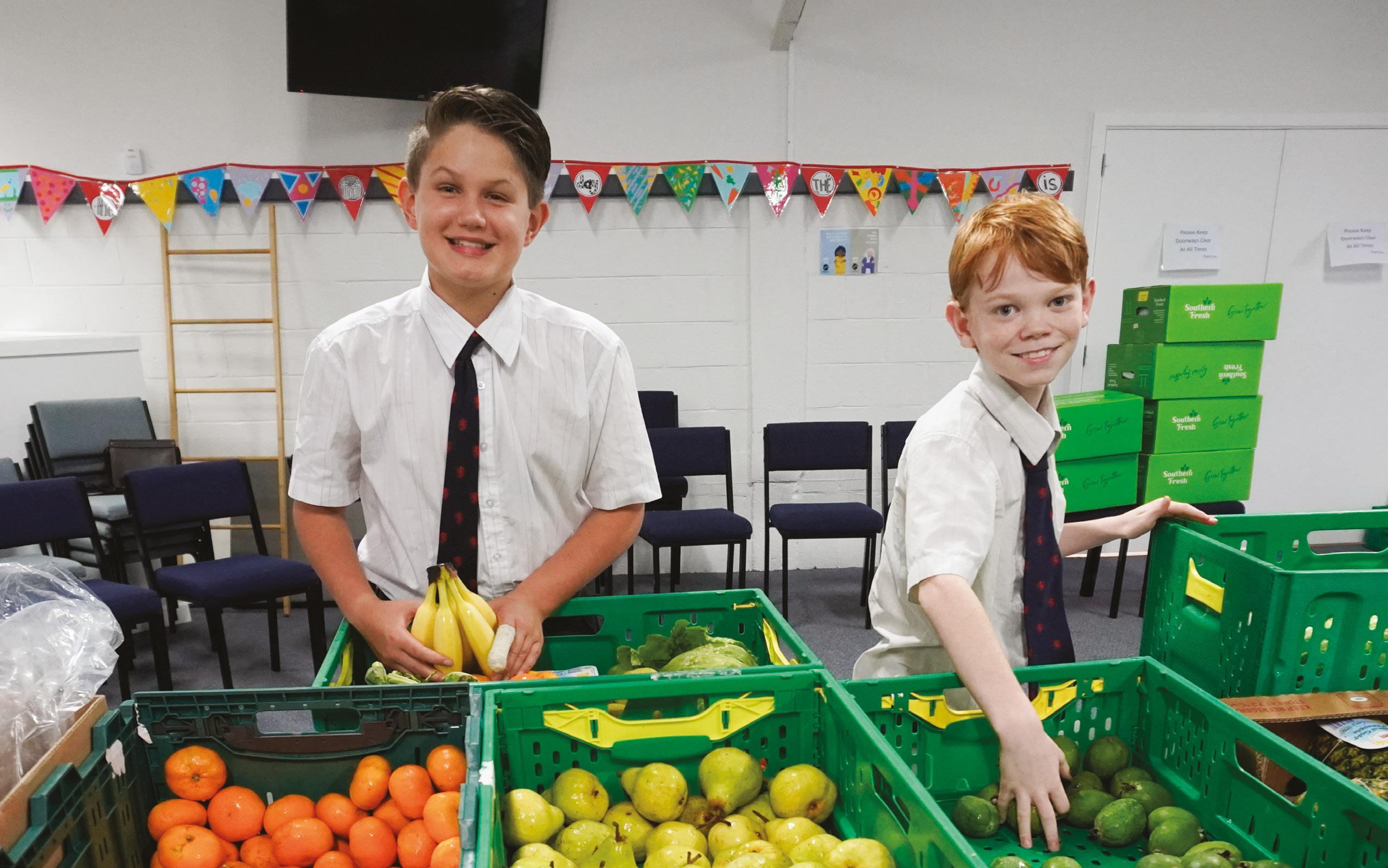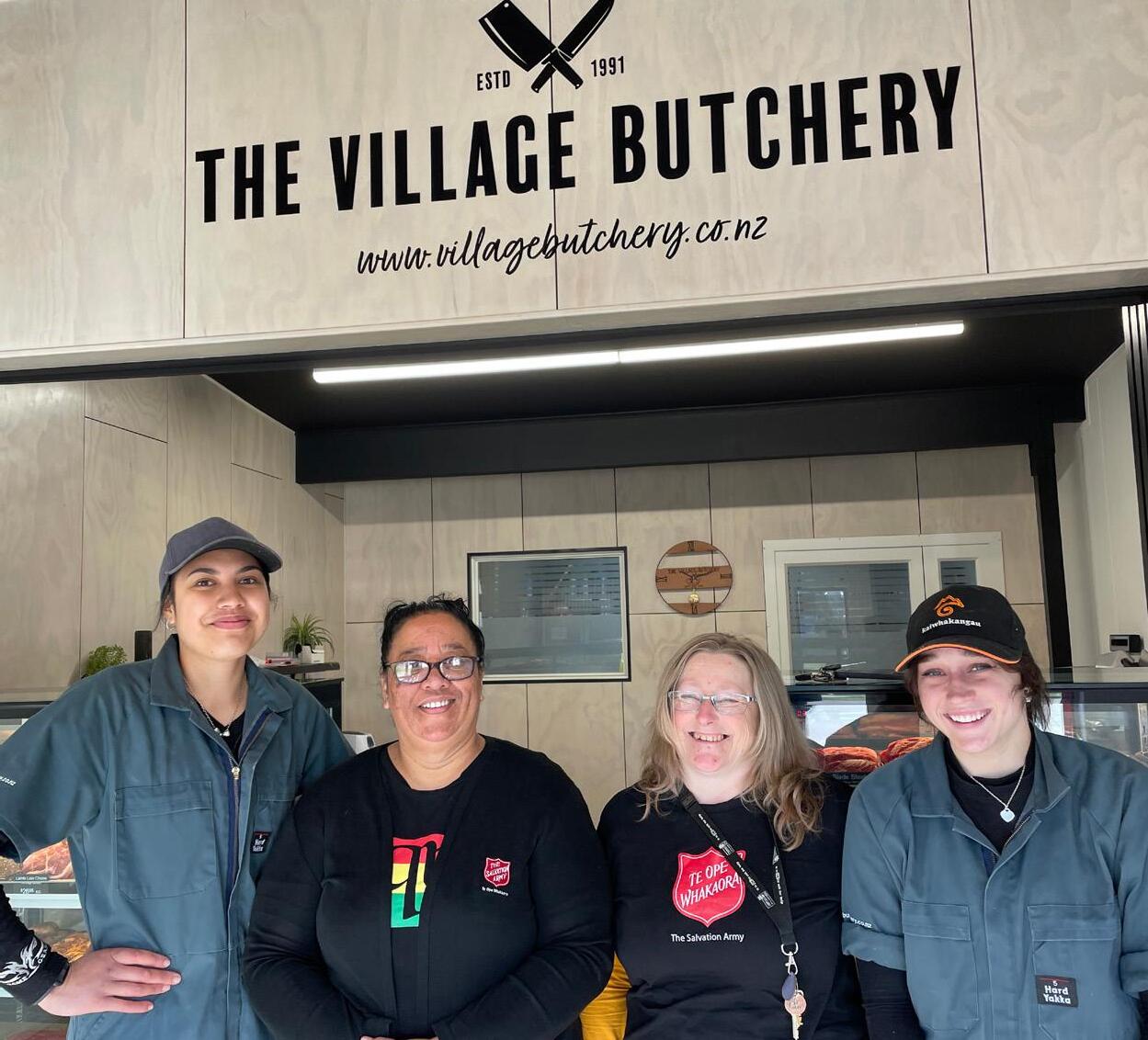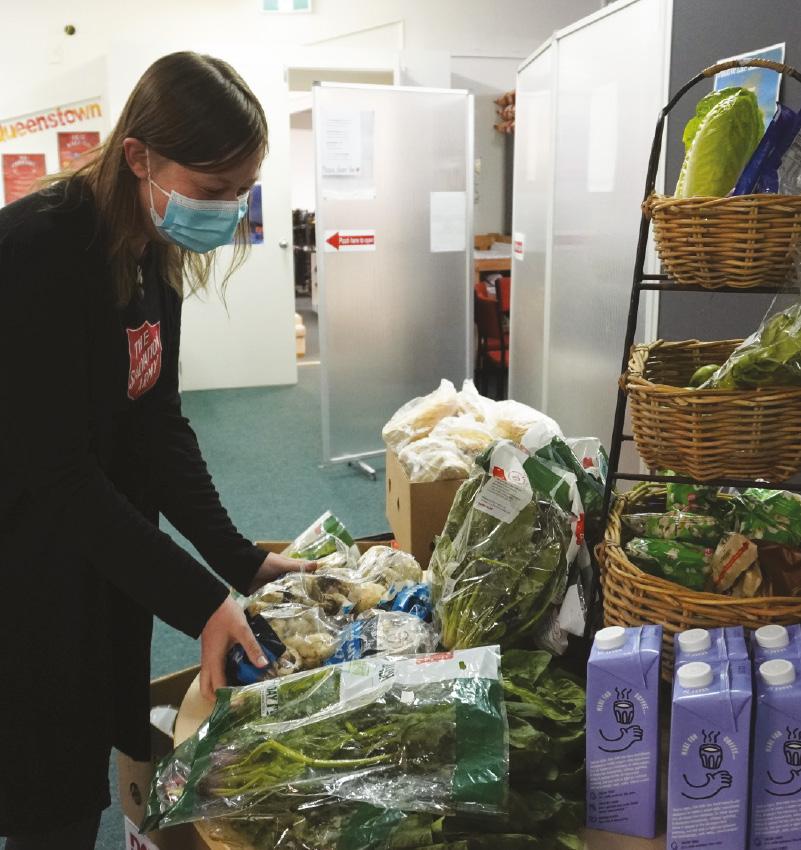
8 minute read
Te Kai Mākona Takes Off
Aroha (love), manaakitanga (holistic care of a person) and whanaungatanga (relationships) are just a few of the fundamental building blocks of Te Kai Mākona, The Salvation Army’s new food security and sovereignty framework. Launched in October 2022, following on from internal consultation and sector research as well as stakeholder and client feedback, Te Kai Mākona is starting to take off all over New Zealand.
WORDS Jules Badger
Life in beautiful New Zealand is not what it was pre-pandemic. The cost-of-living crisis continues to hit already struggling communities hardest, with a shocking one in six New Zealanders living with moderate to severe food insecurity. Unemployment may be at an all-time low, but rent is high in many communities and so are food prices. Where there is employment, hours are long, wages are often low and so is the hope of getting ahead. Food is often the first thing to cut back on when times are tough.
Te Kai Mākona represents a new chapter in The Salvation Army’s 140-year response to addressing food hardship in Aotearoa. It is a more mana-enhancing kaupapa (purpose) that seeks to build on the strengths and capacity people already have. Mākona means to be fully satisfied and have everything you need physically, emotionally, spiritually and socially. This powerful concept expresses our commitment to the pursuit of justice and equity for all New Zealanders experiencing food insecurity.
Demonstrable difference
Te Kai Mākona is an approach designed to support and strengthen those facing food insecurity through three key responses that align strongly with the mission of The Salvation Army of caring for people by strengthening food provision, transforming lives by providing supports that build long-term food empowerment, and reforming society by addressing the underlying causes of food insecurity.
The first of these responses—strengthening food provision—is achieved by working relationally with individuals and whānau (families), using practice that responds to the specific requirements of the person or the family coming to us to meet their immediate food needs.
Lieutenant Andrew Wilson of Queenstown Corps says, ‘Te Kai Mākona strongly reflects our values as a Christian organisation. It’s a kaupapa of grace— all people are created in the image of God and have intrinsic value and dignity and are worthy of being heard. There should be a demonstrable difference between walking into The Salvation Army and walking into a government agency,’ he says. ‘In a community like ours with a lot of migrants who have come to New Zealand with low or no confidence, let alone trust in the likes of government agencies, removing eligibility criteria was a huge priority for us.’
Alexandra Corps Officer Captain Logan Bathurst agrees, explaining that, ‘For us and most of the other agencies in town it’s about getting food to the people who need it, but food is not the end game. The shift from eligibility to accessibility leaves room for building connection and exploring what’s underlying the request for food.’
Real relationships
The second response—food empowerment—is about supporting whānau to strengthen their own food security and sovereignty over time by offering a range of kai (food) supports which build longer-term resilience for households to meet their own food needs. These supports include offering choice model foodbanks (choosing kai), onsite pātaka (sharing kai), community and backyard gardens (growing kai), cooking classes (cooking kai), fruit and vege co-ops (buying kai) and collaboration with other services (partnering around kai).
Early adopters of Te Kai Mākona are finding choice model foodbanks to be a game-changer. Captain Suzanne Bathurst (of Alexandra Corps) says, ‘As an officer trying to live out our mission of caring for people, transforming lives and reforming society, the new choice model foodbank provides real opportunities for connection. Recently I went into the foodbank with a woman, and while she shopped, we talked about her family and she asked me about mine—it was normal, real connection. People are now more likely to open up. If we were still packing parcels and handing them over, we’d miss out on that privilege of deep sharing.’
Alexandra volunteer Diane Barbara adds, ‘Because people can choose, that awkwardness is gone. You’re still providing a food parcel, but people are empowered to choose what they need, not what we think they should have. I love being part of something so positive.’
Hutt City Community Ministries Manager Judith O’Byrne describes the change in the experience of her volunteers. ‘Our team have gone from packing food parcels out the back for people they would never meet, to having conversations with those same people as they help them shop. Real relationships are forming— it’s good for everyone.’
‘I used to come up the stairs and people would be sitting around filling out their clipboards,’ explains Hutt City Centre Leader Major Ivan Bezzant. ‘The environment was transactional. But now there’s a real community vibe and the people are relaxed. I know that is down to the team and how hard they have worked to build that culture of care. It’s so different. From my perspective as a centre leader, all I did was say “yes let’s do this!” And then the team went to work. It’s beautiful.’
Alongside choice model foodbanks, many Salvation Army centres are also offering kai plans, a very useful Te Kai Mākona tool. Kai plans provide assurance of access to food over a longer period, giving people the space and energy to resolve the more pressing issues that are contributing to their food insecurity.
‘Kai plans have been so well received here in Tairawhiti,’ explains Gisborne Community Ministries Team Leader Rayleen Wright. ‘Staff and volunteers appreciate being able to offer kai plans, as they are giving whānau breathing space to work out finances and create sustainability where possible. They provide a workable solution for whānau and encourage ownership.’
Kai plans and choice model foodbanks are just two examples of how Salvation Army centres are strengthening their food provision and building empowerment. Across the motu (land) teams are embracing the freedom of the one-size-does-not-fitall Te Kai Mākona approach and working with local partners to achieve amazing outcomes.
Inspiring innovation
Already a centre with a strong ‘cooking kai’ practice when Te Kai Mākona was launched, Rayleen and the Gisborne team stepped up to become a ‘response food hub’ during the Cyclone Gabrielle relief effort, with volunteers (including local chefs) cooking hot meals for evacuated families and emergency workers. ‘Cooking kai’ is now firmly embedded as a key food support in Gisborne. ‘We also cook and freeze meals using donated and rescued kai from our region,’ says Rayleen. ‘This enables us to provide meals in food parcels for whānau/individuals who need them.’
But it’s ‘hunting kai’ that is the latest innovation born out of the Te Kai Mākona kaupapa. Rayleen works to ensure meat is on the menu through a partnership with Kaiwhakangau—a group of local huntergatherers. With a kaupapa of ‘hunt to live, give and preserve’, Kaiwhakangau has been connecting local foodbanks on the East Coast with Ministry of Primary Industries-certified wild organic meat since 2020. The Village Butchery is also a crucial player in this unique collaboration, processing the meat into sausages and mince, for next to nothing.

Palmerston North Community Ministries Manager Craig Fleury also wants to keep meat on the menu. Recently the team received four pallets of frozen 13kg boxed beef bones. ‘Partnering around kai’ with likeminded people in the community, including a local chef, Craig and his team arrived at a clever, collaborative, cost-effective solution for turning the bulk beef bones into smaller meal-sized vacuum-packed portions for whānau. Alongside the Gisborne team leveraging affordable quality meat provision through the ‘hunting kai’ partnership, the kind of inspiring innovation that Te Kai Mākona invites is clear.
Genuine generosity
‘It’s not just The Salvation Army helping people in our community,’ says Cambridge Centre Leader Lieutenant Ben Cola. ‘There are other amazing social agencies out there for us to be working with because we all want to see our community thrive.’
Cambridge is a small operation, but they have been able to offer a range of food security supports thanks to their strong local partnerships. Once a week, students from St Peter’s School give up their lunch hour to weigh and pack produce to fill the fruit and vege co-op orders. Community Ministries Manager Julieanne Seath explains that co-op members simply go online and order what they want.

‘It’s tailored to their needs, and they pay for it, so their dignity is intact. One woman spent $40 on a box and then went home and got on the Countdown website to compare prices. She would have had to spend $80 there to get what she’d ordered. So we are totally behind this because it is so good for our people. It benefits everyone. And if there is ever anything left over, we can supply the foodbank and people can choose fresh fruit and veges.’
Top thinking
The third prong of Te Kai Mākona seeks to address the underlying causes of food insecurity through research, advocacy and the thought-leadership of our Social Policy and Parliamentary Unit, and by working with other organisations nationally.
On Wednesday 26 July, Te Kai Mākona’s external launch took place, with political advocates and top thinkers in attendance, including Deputy Prime Minister Carmel Sepuloni (see saltmagazine.org.nz/news).
There is excitement at the positive impact Te Kai Mākona is having, not only on whānau and communities across the motu, but also on The Salvation Army staff, volunteers and leaders. This new approach is revitalising joy in serving, as power shifts and connections deepen. Te Kai Mākona builds hope by intentionally working towards food security and sovereignty for future generations.










